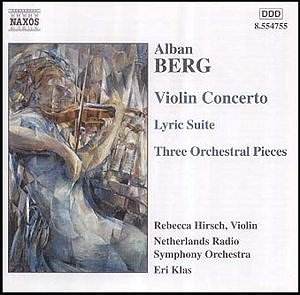Alban Berg was the star pupil of Arnold Schoenberg
and was, to my ears, the most successful and creative composer of the
serialist movement. As is the case with so many great musicians, death
stole him from us at the height of his powers, and while he was, by
today’s standards, still a very young man. His climb to success as a
composer is a testament to his own tenacity and to the qualities of
Schoenberg as a teacher. At the beginning of his education he was barely
capable of writing a strophic song. Upon graduation from Schoenberg’s
class in 1910, he had produced the formidable Opus 3 string quartet.
The masterful violin concerto, one of the composer’s
last works, began life as a commission from the violinist Louis Krasner.
At the time of the commission he was hard at work on his opera Lulu,
which was alas left unfinished. The commission from Krasner was doubtless
accepted solely for financial reasons; but he was inspired to complete
it when Alma Mahler Werfel’s eighteen-year-old daughter died of a brain
tumor in April of 1935. Dedicated "to the memory of an angel,"
this work ranks along with the violin concerti of Samuel Barber and
Sergei Prokofiev as one of the greatest of its genre in the twentieth
century. A work of haunting lyricism, it is all the more poignant for
its emotional restraint. Richard Strauss has only depicted the musical
journey from birth to life to death to resurrection as well in his famous
tone poem on the same subject. Berg’s quotation of the Bach chorale
Es ist genug is a stroke of genius, building his expansive harmonic
vocabulary on the solid, traditional ground of the master from Leipzig.
Rebecca Hirsch gives us a fine solid performance here.
Hers is playing of refined elegance, never overt, always in good taste
with emotions displayed but not on the sleeve. Her tone comes through
with a great deal of richness while never being in your face. Her virtuosity
is expressed through her obvious dedication to the composer’s intentions
for his work, and not on virtuosity for its own sake. There is little
to criticize here except for the doubtlessly difficult final extended
harmonic, which fades in and out of its center more often than makes
the listener comfortable.
Eri Klas and the Netherlands Radio Symphony Orchestra
not only provide superb accompaniment for the concerto, but also deliver
the orchestral works with tremendous success. The beastly difficult
Lyric Suite began life as a six-movement string quartet. Its premiere
in that guise was so successful that Berg re-cast the second, third
and fourth movements for string orchestra. The amazing, multi-layered
string effects are played flawlessly here. The intonation is perfect
and the balance is breath taking. Listening to the intricate goings-on,
especially in the second movement is an absolute delight for the ears.
The Three Orchestral Pieces came about after
some cajoling by Schoenberg for the composer to focus his attention
on more serious, larger compositional forms. The first two movements
were completed in time for Schoenberg’s fortieth birthday celebration
in 1914, and although he completed the third movement the next year,
he would wait until 1930 before he would hear the work performed as
a whole. This is a dark and brooding work, thickly orchestrated and
dramatic. Consistent with the entire program here, maestro Klas leads
an excellent performance.
Naxos sound production is becoming more consistently
fine with every new release. This is a well-focused recording. Details
within the orchestration are captured and the distance between very
soft and very loud is in excellent balance.
Richard Whitehouse, whom I have criticized here before,
has written a rambling and grammatically questionable program note.
His maddening habit of eliminating definite articles, and his tendency
to hyperbolize the dramatic content of a work through the overuse of
big words makes for tiresome reading though others may perhaps have
less of a problem with this. His syntactical errors (the incorrect use
of effect as a verb, for example) are discrediting.
This disc is another jewel in the Naxos crown. Highly
recommended, bad booklet and all.
Kevin Sutton


